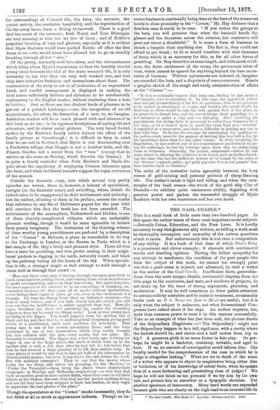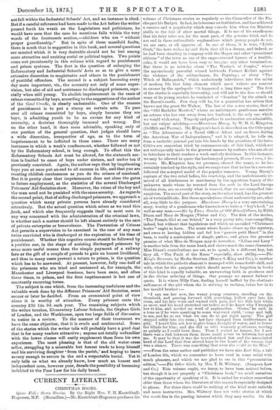THE GAOL CRADLE.*
THIS is a small book of little more than two hundred pages. In this space the author treats of three most important social subjects —Juvenile Crime, Education, and the Poor Laws. It is hardly necessary to say that,Ihowever ably written, so trifling a work must be thoroughly incomplete and unworthy of the serious questions which it raises. But unfortunately this is not even a composition of any ability. It is a book of that class of which Ginx's Baby is a prominent and clever example ; it abounds with sentimental stories and startling epithets. Having the fullest sympathy for any attempt to ameliorate the condition of the poor people who form the subject of this work, we cannot too strongly point out that a good cause is injured, not advanced, by such a writer as the author of the Gaol Cradle. Insufficient facts, generalisa- tions from the most meagre details, sentimental claptrap from the title-page to the conclusion,4)ad taste, and shadows of projects, do not make up for the want of strong arguments, precision, and moderation. It may be well sometimes to draw public attention to certain evils by narrative and by realistic treatment, occasionally books such as It is Never too Late to Mend are useful.; but it is only when the subject is unknown, not when International Con- gresses have talked about it for days. An author requires, too, more than common power to treat it in this -manner successfully. Take as an example of what has just been said, the picture drawn of the Stipendiary Magistrate :—" The Stipendiary! might not the Stipendiary happen to be a tall, rigid man, with a cavity where the bowels should be, and eleven and a half inches from hip to hip ? A generous girth is no mean factor in fair-play. Or per- haps, he might be a bachelor, crotchety, irritable, and aged to boot. If so, no amount of investigation could inform him. The faculty needed for the comprehension of the case in which be is judge is altogether lacking." What are we to think of the sense of a writer who appears to objeet to magistrates being either thin or bachelors, or of his knowledge of actual facts, when he speaks thus of -a most forbearing and painstaking class of judges? We hope he will not think us too personal if we try him by his own test, and picture him to ourselves as a dyspeptic skeleton. Yet another specimen of inaccuracy. Many hard words are expended because girls who are clearly on the high road to an immoral life do * The Gaol Cradle: Who Rocks It? London: Strahan and Co. 1873.
not fall within the Industrial Schools' Act, and an instance is cited. But if a careful reference had been made to the Act before the writer poured forth his wrath on the Legislature and politicians, he would have seen that the case he mentions falls within the very words of the fourteenth section,—children who are " without proper guardianship." Bat in spite of these manifold faults, there is much that is suggestive in this book, and several questions
• are mooted which it is very desirable should not be lost among more attractive and exciting social or political topics. Two points come out prominently in this volume with regard to punishment and prison systems. The first is the question of enlarging the Reformatory and Industrial Schools' Acts so as to give a more extensive discretion to magistrates and others in the punishment of youthful offenders. The second is a subject becoming every day more important, viz., the necessity not only of some super- vision, but also of aid and assistance to discharged prisoners, espe- cially when still young. To abolish imprisonment in the cases of crimes committed by boys, according to the suggestions of the author of the Gaol Cradle, is clearly undesirable. One of the reasons of punishment is to put a stamp on certain acts. To pass over all crimes committed by boys, simply because they are boys, is admitting youth to be an excuse for any kind of enormity, a doctrine thoroughly immoral and wrong. But on the other hand, it does seem advisable, speaking only of one portion of the general question, that judges should have a wide discretion, irrespective of age, as to the term of imprisonment to be inflicted in these cases. There are many instances in which a week's confinement, whether followed or not by the Reformatory school, is long enough. To effect this the Reformatory Schools Act must be altered, for the sixteenth sec- tion is limited to cases of boys under sixteen, and under ten if previously convicted. Again, the author says that by imprisoning boys you at once put an end to all success in life, and that you are treating childish carelessness as you do the crimes of manhood. But it is pretty clear that imprisonment does not close the gates to future employment, as the statistics of the several Discharged Prisoners' Aid Societies show. Moreover, the crime of the boy and theman need not be punished with the same severity. As regards the second point, that of aiding discharged prisoners, we approach a question which many private persons have already considered attentively. But the actual question which arises as we read this ,book, and which also frequently suggests itself to most men in any way concerned with the administration of the criminal laws, is whether such a matter should be left almost entirely to the care of private enterprise or benevolence. The Prevention of Crimes Act permits a supervision to be exercised in the case of any man twice convicted who is discharged at the expiration of his time of punishment. Whether this negative course should be followed by a positive one, in the shape of assisting discharged prisoners by some more useful means than the simple payment of a railway fare or the gift of a couple of pounds to gain an honest livelihood, and thus in many cases prevent a return to prison, is the question which has to be answered. At present, however, fully one-half of the prisoners who are tried and sentenced at, for example, the Manchester and Liverpool Sessions, have been once, and often three times, in prison, and the first imprisonment is but one of constantly recurring terms.
The subject is one which, from the increasing usefulness and the valuable work done by the different Prisoners' Aid Societies, must sooner or later be decided. From an economical point of view alone it is worthy of attention. Every prisoner costs the country 130 14s. 9d. each year. The remaining subjects which the writer touches, Elementary Labour Schools, the Orphan Girls of London, and the Workhouse, open too large fields of discussion to notice in a review. To the manner of their treatment we have the same objection, that it is crude and sentimental. Some of the stories which the writer tells will probably have a good deal that is for many readers attractive ; anyone not totally unfamiliar with the lower classes will easily supplement them from his own experience. The most pleasing is that of the old water-cress seller, struggling by a miserable but honest trade to keep himself and his surviving daughter 'from the parish,' and hoping to leave money enough to secure in the end a respectable burial. Yet it only tells us what we already know, how much an honest and independent man, however poor, dreads the possibility of becoming indebted to the Poor Law for his daily bread.











































 Previous page
Previous page